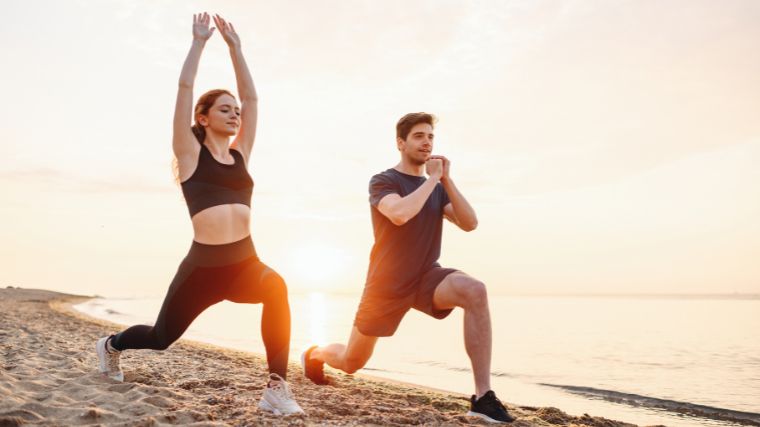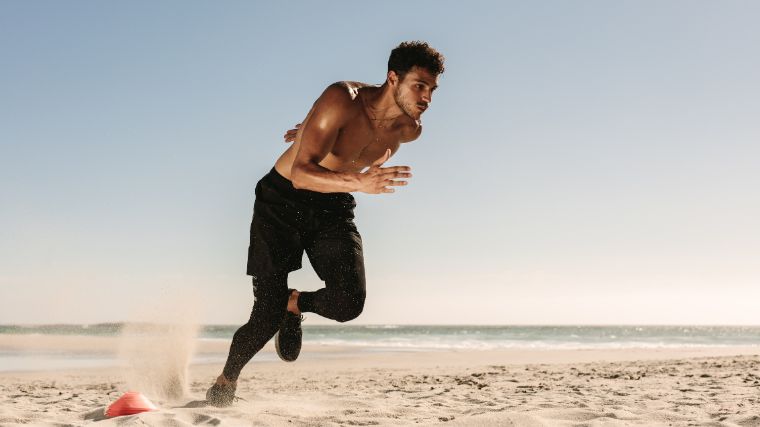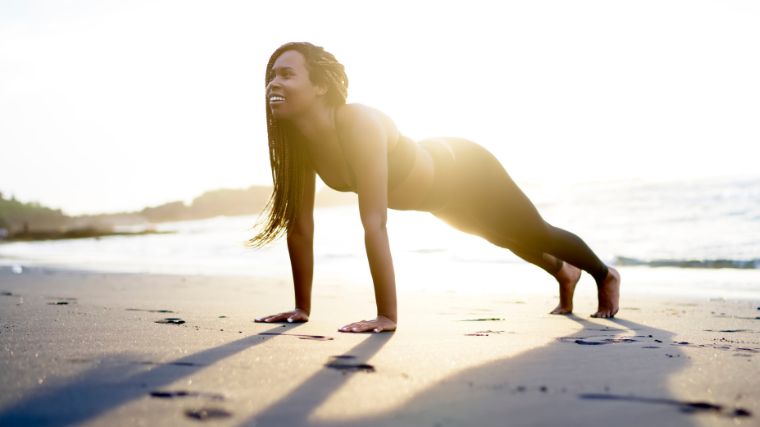Headed to the beach this summer? You’re not alone. According to Newsweek, Americans make a combined 400 million visits to the shore each year (yes, that’s a ton of visits). If you’re one of those water-loving individuals, you may want to get your sweat on in ways that don’t involve just baking in the sun.
And your regular workout program doesn’t have to go out the window when it’s vacation time–even if it’s tempting to just sit on your butt (although there is definitely a time and place for rest). Worried about figuring out a simple and enjoyable workout that you can do anytime you hit the shores? Don’t be.

BarBend is here to help you find the best beach workout. And don’t sweat it if you didn’t bring every kettlebell you own to the beach — you’re covered for that, too.
The Best Exercises for a Beach Workout
Need some exercise suggestions for your next beach day workout routine? Here are some all-time favorites for a workout at the shore:
Lunge
One of the best exercises for the beach is a lunge. You can do this as a bodyweight movement only (on the sand may already be tough enough), or add a moderate set of dumbbells to the equation. Either way, you’ll be able to work on stability and balance as you exercise on uneven terrain.
[Read More: The Best Protein Intake Calculator for Muscle Gain and Fat Loss]
Make sure you hit both the right leg and left leg with equal sets and reps. Do three sets of 10 reps on each side to feel the burn.
How to Do It
- Stagger one leg in front of the other, using your back leg as a kickstand of sorts.
- Drop straight down with your back knee close to the ground (or touching).
- Rise straight back up to complete one repetition.
Crunch
Crunches are a great way to engage your rectus abdominis and enjoy the vitamin D shining down on your face.
[Read More: What Are Workout Splits and Which Is the Best One?]
If you want to make this movement harder, grab a light dumbbell and hold it at your chest. If you don’t have weights, you can even use your beach bag!
How to Do It
- Grab a beach towel and lay it flat, ensuring it is fully spread out.
- Lie down on your back, pressing your lower back into the ground.
- Place both feet flat on the ground, so that your legs form triangles.
- Lightly touch the tips of your fingers to the back of your head, being careful not to pull tightly on the neck.
- Lift from your stomach, bringing your chest closer to your knees.
- Gently lower yourself back down to the original starting position.
Squat Jump
Similarly to lunges, squat jumps are great for the beach because they force you to utilize little-used muscles to keep your body stable. Additionally, a jump squat is great for the beach because it mimics many popular beach activities. Whether you’re jumping in the waves with your little brother or serving in a game of beach volleyball, it’s a useful exercise for the setting.
[Read More: The Best Online Workout Programs For Coaching, Cardio, Value, And More]
Although you could certainly do this exercise on soft sand, squat jumps on slightly firmer, wet sand is ideal. Pro tip: increase or decrease the intensity and impact of this exercise by performing it either on wet sand (easier, more stable) or on dry sand (harder, less stable).
How to Do It
- Bring your feet hips width apart.
- Sit down as if you’re in a chair, with your chest up and butt back.
- Drive up with your arms and jump upwards.
- You’ll continue to do this movement in one fluid motion (try not to pause during the squat) until fatigued.
Glute Bridge
Hip bridges strengthen the posterior chain, which can be useful for tons of beach activities like climbing sand, surfing, and beach volleyball.
[Read More: The Best Back Workout for Men, Women, Strength, and More]
Complete three sets of eight to activate your glutes. Challenge yourself by adding one heavy dumbbell to your lap and repeating the same movement.
How to Do It
- Spread a towel down (like you would for crunches), and lay on your back.
- You’ll then lay your feet shoulder-width apart flat on the ground with your legs making a v-shape.
- Once you’ve engaged your core, push down through your feet, lifting your butt off of the towel.
- Gently bring your butt down, keeping your core engaged throughout.
Beach Workout Warm-Up
Even just a few minutes of warming up can be beneficial for someone preparing to exercise. Warm muscles mean you’ll move easier when it’s time for your body to actually perform. Additionally, warming up is also an opportunity for you to connect your body to your brain and focus on what’s up next.
- Break a sweat by pounding the sand with 5-10 minutes of light jogging, or hopping in the water for a brief swim.
- Perform a series of dynamic warm-up stretches targeting the muscles you want to work.
- Center yourself and focus your mind on what you want the body to achieve.
Try This Full-Body Beach Workout
If you need an actually enjoyable 45-minute workout, you’ve found it. Here are ten simple steps to get a full-body beach workout. Please note: This workout can be done with or without weight (depending on what you have on-hand), but one set of moderate dumbbells are recommended.
- High Knee: 3 x AMRAP
- Weighted Squat: 3 x 10
- Glute Bridge March: 3 x 20
- Plank Toe Tap: 3 x 12
- 1-Mile Run
- Diamond Push-Up: 3 x 12
- Crunch: 3 x 30
- High Plank: 3 x 30 seconds
- Mountain Climber: 3 x AMRAP
To cool down afterwards, hit up a few extended static stretches for any tight or overworked muscles.
The Benefits of a Beach Workout
Want to know why you should even bother to workout on a beach day? Here are a few of the studied benefits:
Improves Stability
According to a study done by the Journal of Exercise Rehabilitation, (1) jumping and running on sand can actually improve stability. This is because jumping in sand (a surface that gives no stability back) forces you to strengthen tiny muscles in the ankle that you may not use jumping on concrete or running on a treadmill.
Increased Vitamin D
Yes, as long as you wear sunscreen, you can enjoy all the benefits, like vitamin D, that the sun has to offer. According to some studies, getting enough vitamin D can “reduce mortality, increase bone strength and calcium levels.” (2)

[Read More: The Complete Guide to Pre-Workout Supplements]
As long as you’re diligent about applying sunscreen and avoiding sunburn during your workout, getting an extra dose of vitamin D is excellent for you.
How to Workout Safely at the Beach
Working out at the beach comes with risks (as do all workouts). Here are the top three things to keep in mind before you start sweating at the beach:
Wear Sunscreen
According to the American Association of Dermatology (AAD), folks should be wearing at least 15 SPF every single day, and they should be reapplying every two hours. And if you’re in the sun or surf? Applying a higher SPF sunscreen more frequently is to your benefit.
Know Your Limits
Imagine you played soccer at a university in the mountains. Naturally, the elevation would be higher, which means one thing: It’s harder to breathe. Since this is the case, it would be particularly important to do plenty of cardio before arriving at the mountain for pre-season, right? So why does this matter? Because when you know what you’re getting yourself into ahead of time, you can adequately prepare. The same goes for working out at the beach.
Don’t attempt the most grueling workout of your life on a blazing-hot summer beach day (unless you have properly prepared for it). The heat can sap energy quickly, and heat exhaustion is absolutely real. It’s also important to take into account the surface you’ll be working out on, as it’s likely quite a bit different than your local CrossFit box. Sand, especially soft sand, can challenge stability.

[Read More: The Best Foods for Energy Before, During, and After Your Workouts]
Plus, running on sand doesn’t give you the energy return you might traditionally feel when you run on pavement. To sum it all up: Keep the temperature, surface, and your ability in mind when planning a beach workout.
Drink Enough Water
Similarly to wearing sunscreen, hydration isn’t anything novel, but it sure is important. The human body is made of 45-75 percent water (4),so naturally you’ll want to rehydrate as you naturally use (and lose) water throughout the day.
The Mayo Clinic recommends around 15.5 cups of water per day for men and 11.5 for women. However, you should adjust this number as needed, accounting for various factors. If you take a dehydrating medication, it’s hot outside, you’re pregnant/nursing, or if you’ve been working out (hint hint), you should up your water intake.
See You at the Shore
The beach is a place to feel rejuvenated. And whether that looks like relaxing in a chair with a good book or performing a set of jump squats, it’s served its purpose. If you can, take 45 minutes out of your beach day to appreciate and celebrate all that your body can do through the power of exercise.
FAQs
Have questions about doing the best beach workout? Here are the answers to your burning queries.
What exercises can I do on the beach?
There are tons of different exercises you can do at the beach. Total-body workouts? Check. Lower body stand workouts that make you want to cry? Double check. The real question? What do you want to do? If you’re into cardio, consider a walk or run on the sand.
It’ll help you utilize stabilizer muscles you may not typically train on grass. And for those who want to resistance train (or strength train), grab a set of resistance bands or dumbbells and do a full-body circuit to really get your sweat on.
What is the best beach workout?
The best beach workout is one you’re excited to do. If you love taking scenic jogs, running on the sand is a great way to activate little-used stabilizer muscles. And if you’re wanting to do a circuit sans equipment, walking lunges from your beach towel to the water paired with some crunches and push ups might be on the menu.
How do you get a six pack?
As seasoned exercisers might know, getting a six pack isn’t as simple as doing a few crunches. Instead, it’s a combination of strength training, eating right, drinking water, and unfortunately, genetics. And for some, six packs aren’t even obtainable. Long story short–don’t compare your abs to someone else’s.
References
- Journal of Exercise Rehabilitation 2019; 15(3): 439-444. Published online: June 30, 2019
- Raymond-Lezman JR, Riskin SI. Benefits and Risks of Sun Exposure to Maintain Adequate Vitamin D Levels. Cureus. 2023 May 5;15(5):e38578
- Giatsis, G.; Panoutsakopoulos, V.; Kollias, I.A. Drop Jumping on Sand Is Characterized by Lower Power, Higher Rate of Force Development and Larger Knee Joint Range of Motion. J. Funct. Morphol. Kinesiol.2022, 7, 17.
- Zhang J, Zhang N, Du S, Liu S, Ma G. Acute Water Supplementation Improved the Body Composition of Young Female Adults After Water Restriction of 12 h in Baoding, China: A Randomized Controlled Trial (RCT). Front Nutr. 2022 Jun 20
Featured Image: ViDI Studio / Shutterstock